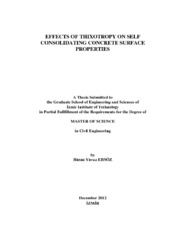Please use this identifier to cite or link to this item:
https://hdl.handle.net/11147/3548Full metadata record
| DC Field | Value | Language |
|---|---|---|
| dc.contributor.advisor | Erdem, Tahir Kemal | - |
| dc.contributor.author | Ersöz, Hasan Yavuz | - |
| dc.date.accessioned | 2014-07-22T13:51:47Z | - |
| dc.date.available | 2014-07-22T13:51:47Z | - |
| dc.date.issued | 2012 | - |
| dc.identifier.uri | http://hdl.handle.net/11147/3548 | - |
| dc.description | Thesis (Master)--Izmir Institute of Technology, Civil Engineering, Izmir, 2012 | en_US |
| dc.description | Includes bibliographical references (leaves: 81-85) | en_US |
| dc.description | Text in English; Abstract: Turkish and English | en_US |
| dc.description | xii, 91 eaves | en_US |
| dc.description.abstract | Self-consolidating concrete is a high performance concrete that does not require vibration for placing and compaction. It is able to flow under its own weight compeletly filling the formwork and achieving full compaction. Self consolidating concrete reduces construction time and cost, also faults resulting from the poor workmanship. In this thesis, the effects of thixotropy on surface properties and durability were investigated. Concrete Mixtures were produced with different three slump flows (55 cm , 65 cm , 72 cm). Rheology and thixotropy of fresh concrete were examined by Contec 4SCC concrete rheometer. To obtain different surfaces, following parameters were changed: Thixotropy (by changing slump flow), release agent (six different types), formwork type (steel, plexiglas, plywood) and pressure application (equivalent to the weight of 10 m high fresh SCC) on specimens during setting. Concrete specimen surfaces were captured and digitally recorded on a hard drive. Digital images were analyzed by an image processing software, Image J. Compatibility of mixture type, material and release agent varieties was studied to minimize voids on surfaces. In the last stage of the thesis, durability and permeability of selected mixtures were investigated by performing sorptivity permeability, salt scaling and chloride ion penetration tests. It was found that, the surface quality depends on both thixotropy and release agent. Moreover, the release agent has to be selected according to the formwork material. In other words, for best surfaces release agent, formwork material and thixotropy have to be considered simultaneously. In general plywood formworks resulted in better surfaces in comparison to steel and plexiglas. Furthermore surfaces exposed to pressure gave better results. At the end of this work a table was prepared to make surface categorization which can be used as a reference for future works. | en_US |
| dc.language.iso | en | en_US |
| dc.publisher | Izmir Institute of Technology | en_US |
| dc.rights | info:eu-repo/semantics/openAccess | en_US |
| dc.subject.lcsh | Self-consolidating concrete | en |
| dc.title | Effects of Thixotropy on Self Consolidating Concrete Surface Properties | en_US |
| dc.type | Master Thesis | en_US |
| dc.institutionauthor | Ersöz, Hasan Yavuz | - |
| dc.department | Thesis (Master)--İzmir Institute of Technology, Civil Engineering | en_US |
| dc.relation.publicationcategory | Tez | en_US |
| dc.identifier.wosquality | N/A | - |
| dc.identifier.scopusquality | N/A | - |
| item.openairecristype | http://purl.org/coar/resource_type/c_18cf | - |
| item.languageiso639-1 | en | - |
| item.openairetype | Master Thesis | - |
| item.grantfulltext | open | - |
| item.fulltext | With Fulltext | - |
| item.cerifentitytype | Publications | - |
| Appears in Collections: | Master Degree / Yüksek Lisans Tezleri | |
Files in This Item:
| File | Description | Size | Format | |
|---|---|---|---|---|
| T001066.pdf | MasterThesis | 2.21 MB | Adobe PDF |  View/Open |
CORE Recommender
Page view(s)
146
checked on Mar 31, 2025
Download(s)
80
checked on Mar 31, 2025
Google ScholarTM
Check
Items in GCRIS Repository are protected by copyright, with all rights reserved, unless otherwise indicated.